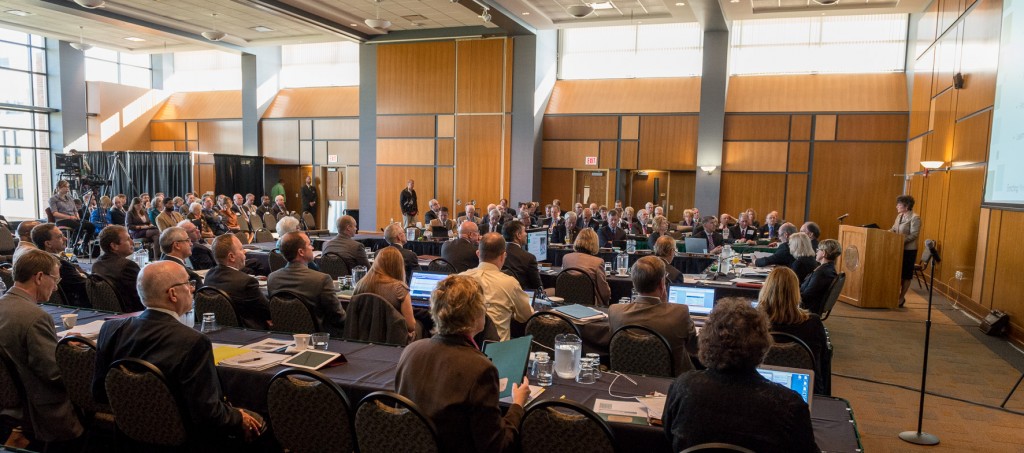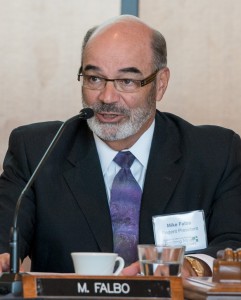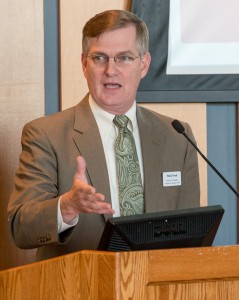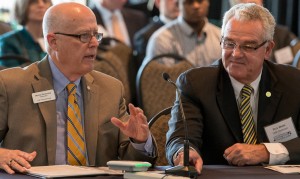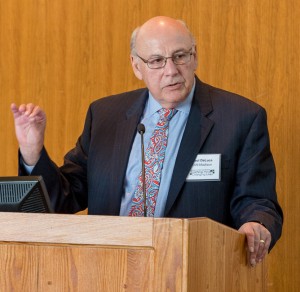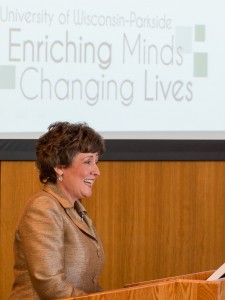SOMERS, Wis.– Acknowledging the need to maintain competitiveness in recruiting and retaining senior academic leaders, the University of Wisconsin Board of Regents reviewed a new policy on Executive Salary Structure and approved salary adjustments for some senior academic leaders.
State statutes require that Regents establish market-based salary ranges for the UW System President and Senior Vice Presidents, all 14 UW Chancellors, and the 2 Provosts at UW-Madison and UW-Milwaukee. For the 13 Provosts at non-doctoral universities and the UW System Vice President, the Regents must request action by the legislature’s Joint Committee on Employment Relations (JCOER).
- See the Oct. 10 UW System news release
The new policy, approved today by the Regents’ Business and Finance Committee, brings greater consistency to the range-setting process, ensuring that market assessments will be done every two years. Regents on the committee voted to broaden salary ranges in ways that will allow more flexibility in setting pay relative to each leader’s scope of responsibility, years of UW service, experience elsewhere, and other individualized factors. The policy changes will be taken up by the full Board tomorrow.
“Some of these ranges have not been updated since 2006 or 2008. Benchmarking these ranges against real market data, and doing so on a regular schedule, makes good sense. Our UW System institutions need strong leadership. That means keeping the effective leaders we have today, and ensuring that future searches attract top talent,” said Michael J. Falbo, President of the Board of Regents. The search for a UW System President is under way, and the search for a new Vice President for Finance at UW System will begin soon. UW-Madison will soon be searching for a new Provost.
In closed session today, the full Board of Regents approved individual salary adjustments for 12 of the 14 UW Chancellors. These are the first base salary adjustments for Chancellors since July 2008, except for the 1% pay plan increase that took effect this year for all state and UW employees. Since 2008, seven new Chancellors have been hired at non-doctoral institutions at higher salaries than veteran Chancellors.
UW System opens the books on accountability
The UW System is both enrolling a larger percentage of resident high school graduates and graduating UW students at higher rates than the national average, according to accountability reports presented to the Board of Regents on Thursday.
One in three (32%) Wisconsin high school graduates in fall 2011 enrolled in a UW institution – compared to a rate of one-in-four (26%) enrolling in a four-year college or university nationwide. Sixty percent of new freshmen graduated within six years from the same UW campus where they first enrolled – topping the national rate of 56.6% at public four-year institutions.
“There is much interest in how our colleges, universities, and outreach networks are performing. By making the information available in a clear, simple format, we hope to showcase our strengths and focus attention on areas where improvement is needed,” said UW System President Kevin P. Reilly.
- See the Oct. 9 UW System news release
Mark Nook, Senior Vice President for Academic and Student Affairs, presented selected findings from the current accountability reports within a 10-year context.
- See the
There has been a 15-20% increase in the number of degrees conferred in last 10 years, he said, which is significantly ahead (34%) of the Growth Agenda target pace. Nook noted that the fields where degrees are conferred is as important as the total number of degrees. “In key areas to drive the economy, we are turning out more graduates,” he said, pointing to particular growth in the business, health-related, and science fields.
Regents also reviewed reports addressing 38 specific reporting requirements mandated by the State Legislature. These include one accountability report for UW-Madison and one for all other UW System institutions.
“These reports represent our commitment to providing our stakeholders with a detailed assessment of what we’re doing and how well we’re doing it. It is important not only to our institutions, but also to our many diverse stakeholders – from students and their families, to legislators, to every tax-paying resident in the state who has an investment in the UW System,” said Regent President Michael J. Falbo.
Looking at overall UW System enrollment figures, Regent Regina Millner observed that while the proportion of under-represented minorities has increased over the past 10 years, there is an unexplained decline in Native American representation.
Regent Ed Manydeeds urged the Board to focus attention on that deficit. “This is a crisis for our people now. They need to be educated. The tribes know it is an issue, and I would respectfully ask that this great system think about doing more. It’s within our means and it’s our responsibility,” Manydeeds said. He pointed out that the recently signed agreement between the Ho-Chunk Nation and UW-Eau Claire is the first of its kind in the UW System.
“We have a unique opportunity to reach out and better serve this population,” Nook said. “It’s a problem we need to spend some time on.”
Regents also had questions about four-year graduation rates that are slightly lower than the national average – while the System’s six-year graduation rate is higher. Students need to be made aware of the economic impact of taking less than-full-credit load, they heard.
UW-La Crosse Chancellor Joe Gow reminded the group that the business, engineering, and health-related disciplines – where enrollments are up – are also among the more expensive fields that institutions provide, with particular challenges in faculty compensation.
Several chancellors provided the Board with a few highlights from their individual campus reports. Chancellor Bernie Patterson highlighted the fortified focus on economic development at UW-Stevens Point. “Today, we are at the table in those conversations, and we are bringing the full weight of the university to bear on those conversations,” he said. He added that faculty and staff want to be involved in such endeavors, but they need university support. “We must be willing to take chances. We can’t afford analysis paralysis,” he said.
Provost Paul DeLuca presented key points from the UW-Madison accountability report. He noted that the university’s degree production is up to 10,052 in 2012-13, which is “on target and about at the limit of what we have the capability to do.” He added that UW-Madison currently receives $48.1 million in total institutional aid, with most growth due to the Madison Initiative.
DeLuca told Regents that the retention gap for targeted under-represented minorities has been “virtually eliminated” at UW-Madison, with early intervention tactics providing especially successful.
UW-Parkside is “Enriching Minds, Changing Lives”
Chancellor Debbie Ford welcomed Regents to the UW-Parkside campus as it celebrates its 45th academic year. She recognized founding Chancellor Irvin G. Wyllie’s vision, as well as the contributions of others from the early days of the institution, including Fran Jaeschke (’71), one of the only females on the “Committee of 100” – the original advocacy group for the creation of a four-year university in southeastern Wisconsin. Ford told Regents that a new sculpture, “Come About,” created by UW-Parkside art student Mallory Olesen Willing in collaboration with art professor Trenton Baylor, was commissioned to honor Jaeschke’s long-standing commitment to the university.
Ford reported that new student enrollment at UW-Parkside for fall 2013 is up, first-to-second year retention has risen to 72 percent, and there are more students living on campus now than at any time in the university’s history. The diversity of the student population also continues to increase, Ford said. Students of color currently account for more than 28 percent of all students – the highest percentage of any university in the UW System.
A wide-ranging presentation showcased student involvement in internships and research projects. A video highlighted the experiences of five UW-Parkside pre-med students who spent two months in Madison this past summer at the UW School of Medicine and Public Health as part of the RUSCH program (Rural and Urban Scholars in Community Health). The UW-Parkside pre-med and pre-health programs typically place 90 percent of graduates in medical and professional schools – more than double the national average.
Another video montage illustrated the diverse ways that students are engaged in their community, from internships at places like Milwaukee’s ESPN Deportes, to professional partnerships such as UW-Parkside’s 25-year working relationship with the Fireside Theatre in Fort Atkinson, Wis., one of the most successful professional theatres in the Midwest.
Ford told the Board that UW-Parkside’s accreditation has just recently been reaffirmed through 2022-23 by the Higher Learning Commission (HLC). The university’s academic plan, “Making Excellence Inclusive,” is a vital source of strength to the institution, Ford said.
Ford acknowledged that the pace of change on the UW-Parkside campus is challenged by declining funding and stagnant salaries. “We are not sitting still. We are intensely examining and modeling our financial picture across a 3-year horizon,” Ford said, adding that the university is actively looking to define and discover new opportunities.
“It’s not that we are change averse,” Ford said, “but we are having to balance many competing priorities.” While the challenges might be coming more rapidly than in the past, “what is certain is that UW-Parkside and the State of Wisconsin will be better tomorrow because of our being here today,” she said.
- See
Regents approve new salary ranges for senior executives
With critical recruitments upcoming for the UW System President, the Provost at UW-Madison, the UW System Vice President for Finance, and two Provosts at UW comprehensive institutions, the Committee approved new, more competitive salary ranges – setting the stage for closed session discussions.
The approved salary range minima and maxima would be set at 80% and 120% of adjusted peer medians, respectively – a change from the current 90% to 110%. It was agreed that the narrowness of the current ranges limits competitiveness and discretion to set salaries appropriate to individual circumstances.
While acknowledging the need for salary range adjustments, Regent Jan Mueller noted: “This is going to be challenging. Other stakeholders are going to be asking why we’re doing this now when so many other issues are facing the university.” Nonetheless, she said, “There is an arms race for academe that doesn’t necessarily exist elsewhere.”
Regent Gerald Whitburn, committee chair, called the adjusted salary ranges “prudent.” “I think it’s imperative that we not underfund these posts. The proof’s in the pudding. We just recruited a strong, qualified chancellor for (UW-)Madison. Now we have to do the same thing for the (UW System) president’s chair.”
Senior Vice President David Miller added: “In the scheme of our budget, these are very small numbers.”
Pruitt reminded the Committee that competitive gaps in provost compensation must also be considered. President Reilly agreed, noting that “Provosts have become much more day-to-day managers, stepping into the chief executive role when chancellors are away.”
Program Revenue Appropriation Balances and Reserves: The Committee approved a UW System policy establishing a minimum reserve level of 10% and a reporting threshold requiring justification for balances above 15%. It is reiterated that the 15% reporting threshold is NOT a cap on year-end balances but simply a level above which institutions will be required to provide justification in reports to the Board.
While supporting the policy, Regent Margaret Farrow stressed the need for the Board to revisit that policy on a periodic basis. “It shouldn’t be cast in stone,” she said.
Reiterating that the UW’s finances are “much, much, more complicated” than corporations that can readily predict revenue, make business plans, and identify risks, Regent David Walsh said, “The beauty of your solution is we’re going to keep talking about it.”
Regent Chuck Pruitt also called it “a major step forward in terms of policy.” “What this policy does is it’s going to bring the conversation to the board in a completely open and transparent way,” he said.
In other business, the Business and Finance Committee:
- Approved a UW System policy regarding expenditure of tuition and fee revenues and state general purpose revenue at each institution. The policy explains how each institution charges expenses initially to its GPR funds, then UW System Administration uses a monthly process to distribute a proportionate amount of expense to both the GPR fund and the tuition fund. At the end of the fiscal year, any expense amount exceeding the remaining amount of GPR is transferred to the tuition fund, because the GPR fund cannot be overspent.
- Authorized the UW System President to request statutory changes in order to allow an orderly, uninterrupted transition of telecommunication services from WiscNet to the UW System’s new network. The change requested would move the statutory deadline from July 1, 2014 to January 31, 2015.
- Received a report on organizational changes related to the UW System Human Resource System, which essentially move the operation and reporting lines fully to the UW System Administration. The change is being made in response to the recent PricewaterhouseCoopers risk assessment that noted “the leadership structure over the UW Service Center and related HR processes would benefit from clearer definition of the parties responsible for the strategy, direction and oversight of the UW Service Center”;
- Approved a major football game contract between the UW-Madison Division of Intercollegiate Athletics and the Green Bay Packers Inc. and the Trustees of Louisiana State University. Under terms of the agreement, the University will receive $3 million from the Green Bay Packers for a Sept. 3, 2016, game against Louisiana State University to be hosted at Lambeau Field in Green Bay; and
- Approved a sponsored research agreement between the UW-Madison Office of Industrial Partnerships and Avon Hi-Life, Inc. Recently proposed changes to the agreement had pushed the value of the contract above the threshold requiring Board of Regents approval.
Education Committee
UW System task force will examine remedial education
With national data clearly indicating that the number of college freshmen who are being placed into remedial classes is rising, President Reilly announced that he will be appointing a task force to examine remedial education efforts across the UW System.
Noting that remedial classes typically extend students’ time-to-degree as well as the overall cost of their college education, Reilly said, “Neither of these outcomes is acceptable.”
The task force will review the current Regent, System, and institutional policies relating to remedial education in the UW System. It will also review national studies on remedial education to identify best practices that might be implemented at UW institutions.
Senior Vice President Mark Nook led a presentation and discussion on trends in students’ remediation placements, retention, and degree completion. He also talked about national, emerging research, and best practices regarding remedial education and what the UW System could learn from these innovations.
- See the
A current report on UW System’s remedial education will be presented at the December Board of Regents meeting. The task force will be charged with delivering its recommendations by the end of the 2013-14 academic year.
UW-Parkside Presentation: Interim Provost Fred Ebeid told the Education Committee that reaffirmation of accreditation and approval to pursue an open pathway granted by the Higher Learning Commission (HLC) is a true indication of UW-Parkside’s ability to evaluate and develop academic programs.
He told the committee that new versions of developmental courses are more rigorous in content and demanding of student performance, and the results have been impressive. “Student success rates in our elementary algebra course increased from around 53 percent to nearly 70 percent in the first year,” Ebeid said.
Ebeid reported that the university is pursuing new delivery methods and pathways to meet the needs of post-traditional students, such as advancing online and blended courses, increased articulation agreements with public two-year and technical colleges, and the UW Flex Option. A faculty-led task force at UW-Parkside is developing two Flex Option certificates to be offered in fall 2014.
- Link to video: “A Day in the Life of a UW-Parkside Student”
In other action, the Education Committee:
- Approved UW System re-appointments to the Natural Areas Preservation Council;
- Approved the Bachelor of Science/Bachelor of Arts in Criminology and the Master of Science in Applied Economics, both at UW-Whitewater;
- Approved the Bachelor of Arts in Writing at UW-Superior;
- Approved the Professional Science Master (P.S.M.) in Conservation Biology at UW-Stout; and
- Approved the revision of Regent Policy 14-6 on Racist and Other Discriminatory Conduct and Regent Policy 14-9 on Discriminatory Harassment. The proposed revisions to RPD 14-6 and the elimination of RPD 14-9 create a single policy focused on protecting students and employees from discrimination, harassment, and retaliation, and contain definitions of discrimination and discriminatory harassment that comport with current case law and state and federal statutes.
Research, Economic Development, and Innovation Committee
Incentive Grant Program: Emeritus Regent Jeff Bartell outlined the parameters of the 2013-2015 UW System Incentive Grant Program, which is designed to provide $22.5 million in UW System funding to support economic development, workforce development, and improvements in the affordability of higher education in this biennium.
Regent Tim Higgins, chair of the REDI committee, called the grants program “a real shot in the arm.”
The deadline for proposal submissions is Oct. 15, with decisions to be announced in November.
UW-Parkside Update: From research involving “crowd sourcing” to innovative drive systems for wheelchairs, Chancellor Ford provided an overview of UW-Parkside undergraduate research, economic development, and collaborations with technology companies that are working with WiSys.
- See the
Several initiatives were showcased, including computer science professor Derek Riley’s crowd-sourcing research that may enable large numbers of people to determine answers to a variety of challenges better than a computer. By presenting a traffic jam, for example, as a “game” that millions of people play, the way in which the respondents solve the “jam” may provide better solutions than a standard computer.
Business professor Abey Kuruvilla engages undergraduate students with hundreds of projects involving operational challenges faced by businesses and organizations such as FedEx and Aurora Health Care.
Jim and Teresa Maerzke lead the Procubed team developing a new drive system for wheelchairs. UW-Parkside has contributed space and the talent resources of students and faculty to aid in the development of the highly efficient drive system. Regent President Falbo did a “test drive” and pronounced it impressive.
WIST Update: Paul Fowler of the Wisconsin Institute of Sustainable Technology (WIST) at UW-Stevens Point provided an update on WIST research in the areas of biofuels, renewable materials, and related disciplines. He said the multi-departmental collaboration between WIST, Paper Science & Engineering, and Fine Arts entities to produce a high quality fine art paper illustrates the university’s innovative, interdisciplinary approach.
Capital Planning and Budget Committee
UW-Parkside Campus Master Plan: Kim Kelley, assistant vice chancellor institutional effectiveness, and Mel Klinkner, vice chancellor finance and administration, presented the Capital Planning and Budget Committee with updates to the UW-Parkside campus master plan.
- See the
Recent enrollment trends at UW-Parkside, Kelley said, have resulted in the sciences having the highest number of students in any of the university’s four colleges. The interest in STEM fields is also high among transfer students. Articulation agreements are in place and being developed to attract more students to the STEM fields. In order to meet the needs of current students and those of future students, the campus master plan addresses renovations and expansions to science areas, including chemistry labs.
Klinkner noted the successful completion of the most recent master plan that resulted in larger, up-to-date spaces for the arts and humanities (the Rita Tallent Picken Regional Center for Arts and Humanities), and campus life (Pike River Suites and the Student Center).
In other business, the Capital Planning and Budget Committee:
- Approved UW System’s request for authority to lease space for the UW Service Center at 660 West Washington Avenue in Madison. That center, along with the UW-Madison Division of Information Technology, provides and manages the operating system for personnel, payroll, and benefit data/processes for all UW institutions and the UW System;
- Approved UW-Milwaukee’s request for authority to increase the budget of the Kunkle Building Demolition project;
- Approved UW-Stevens Point’s request for authority to construct the $13.5-million North DeBot Residence Hall Renovation-Phase II project, which will renovate Watson Hall during the summer of 2014 and Thomson Hall during the summer of 2015;
- Approved UW-River Falls’ request for authority to construct the $62.4-million Falcon Center for Health, Education, and Wellness project;
- Approved UW-Whitewater’s request for authority to construct the West Campus Residence Hall Renovation-Phase I project for $17.7-million Program Revenue Supported Borrowing. Phase I of this project will renovate Arey and Fricker residence halls, which were originally constructed in the 1960s;
- Approved UW System’s request for authority to construct the two Facilities Renewal Program projects: the UW-Stout Harvey Hall Renovation-Phase II project and the UW-Oshkosh Clow Social Science Center and Nursing Education Building Renovation project; and
- Approved UW System’s request for approval of one All Agency Maintenance and Repair project with an estimated total cost of $1.2 million that will renovate and upgrade the fire protection systems in Greenquist and Wyllie halls at UW-Parkside.
Photo credit: Don Lintner, UW-Parkside Photo Services
###
The UW System Board of Regents will continue its meeting at 9 a.m., October 11, 2013, at UW-Parkside.
Related: October 11 (day 2) news summary

